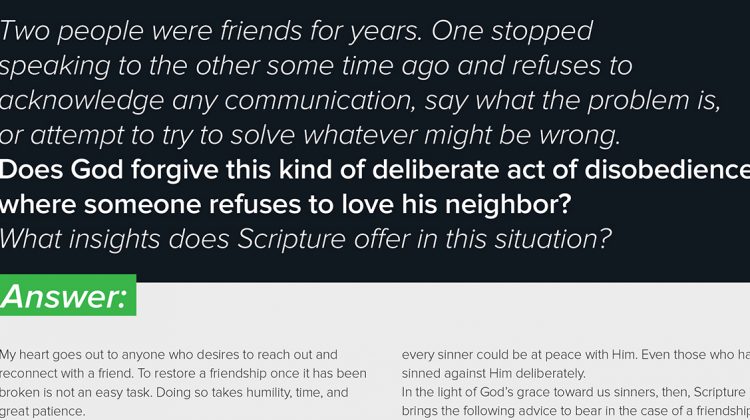
Two people were friends for years. One stopped speaking to the other some time ago and refuses to acknowledge any communication, say what the problem is, or attempt to try to solve whatever might be wrong. Does God forgive this kind of deliberate act of disobedience where someone refuses to love his neighbor? What insights does Scripture offer in this situation?
My heart goes out to anyone who desires to reach out and reconnect with a friend. To restore a friendship once it has been broken is not an easy task. Doing so takes humility, time, and great patience.
To answer the question about God’s forgiveness for a deliberate act of disobedience, perhaps we see best by going back to the first sin. Did Adam and Eve disobey God by accident? Was their foray into eating forbidden fruit purely the result of the serpent’s trickery and a moment of weakness on their part? Scripture tells us that Eve’s sin was no accident. After talking with the serpent, Eve approached the tree of the knowledge of good and evil to investigate for herself. And when she “saw that the tree was good for food, that it was pleasant to the eyes, and a tree desirable to make one wise, she took of its fruit and ate” (Genesis 3:6, NKJV). Eve rationally considered what she was about to do before she did it. And she was not alone; Adam was with her. Their decision to disobey was a defiant act against God.
If only sins of weakness could be forgiven and not deliberate sins, none of us would have a leg to stand on because we all sin deliberately. At various times in our lives, we actively pursue wrongdoing, rationalizing evil in our hearts and lives in the same way that Eve looked at that forbidden fruit and saw it was good for eating. We allow angry grudges to fester in our hearts, convinced that we are in the right and the other person is in the wrong. We entertain lusts and evil desires because we’ve convinced ourselves that we deserve to have what God has forbidden. For that, we deserve to be cut off from God for all eternity.
Yet instead of cutting us off, God in His mercy and love seeks us out and calls us to repentance. He graciously went to Adam and Eve in the garden. Through His Word, He calls us to confess our sins and seek His mercy and forgiveness. And then He forgives us! God promised a Savior to crush the serpent’s head. That’s how great the Father’s love is! He willingly offered up His own Son to die on a cross so that every sin could be forgiven and every sinner could be at peace with Him. Even those who have sinned against Him deliberately.
In the light of God’s grace toward us sinners, then, Scripture brings the following advice to bear in the case of a friendship where the love has turned cold. In the Sermon on the Mount, Christ tells us if our brother has something against us, we should make every effort to resolve the matter. “First be reconciled to your brother,” Jesus says (Matthew 5:23-24). Don’t give up on your friend. Be persistent, but patient, too. If phone calls aren’t working, try reaching out with a gently-worded letter or sending an email.
When reaching out, remember the encouragement of the apostle Paul to put away bitterness and wrath and to “be kind to one another, tenderhearted, forgiving one another, just as God in Christ forgave you” (Ephesians 4:31-32). Instead of blaming or finding fault, exercise humility and offer to apologize. The words “I’m sorry” can go a long way toward healing a rift.
These efforts may or may not be successful. Sometimes Christian friends decide that they need to take their lives in different directions from each other now so they can enjoy a truly good friendship in heaven. Yet we do not need to be deterred by the prospect of failure, either. Remember God’s loving persistence in calling us sinners back to Himself. As His dear children, imitate His love, “as Christ also has loved us and given Himself for us” (Ephesians 5:1-2).
Rev. Piet Van Kampen